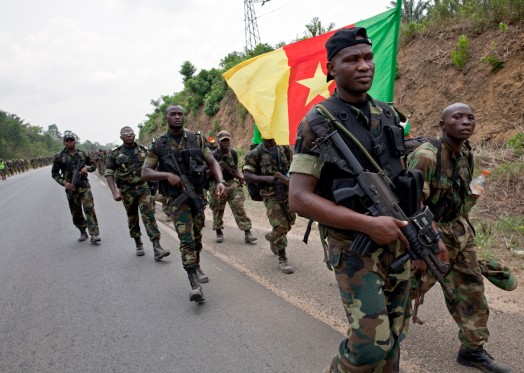ZONE ROUGE

It wasn’t easy to reach Mabass. Past the sprawling refugee camps and the dusty market small town of Mokolo, the road becomes a broken track climbing the rocky hills. The soldiers at the check point were suspicious of my presence, they hadn’t seen “blancs” on that trail, but after some bargaining I could go ahead. Mabass is at the heart of the military red zone where the Cameroonian army fights BH, the ruthless jihadists of the Boko Haram religious sect.
Last January this village of mud huts and scorched millet fields was stormed by the insurgents: houses and crops were torched, farmers were gunned down and seventy people were kidnapped and dragged over the Nigerian border to Gwoza, a few miles away, where the sect’s leader Abubakar Shekau has established the “capital” of his bloodthirsty caliphate. Some of the women have managed to escape and return to Mabass but none of the men has come back: they will be forced to fight with BH or be killed.
I walk past the charred ruins of a baptist church, the incinerated shacks, the walls blackened by fire. The army has hastily dispatched its élite troops, the Bataillon d’intervention rapide (B.I.R.), to secure the border. But the villages on the frontline are trapped in the fighting. In the few hours I spent in Mabass I heard the close blast of several explosions and mortar shells in the foothills: as the Chadian forces advance in the North, Boko Haram is apparently regrouping here in the rugged hidings of the Mandara mountains.
“We live in terror” says the Lauan, the village’s chief. “They can come any time and kill our children. The soldiers are here to protect us but can’t be everywhere: the land is too vast”. He points at the sky: the harmattan, the desert wind, is obscuring the sun and visibility is poor. “This is a dangerous season. Those devils always strike at dawn when the sand wind blows”.
Thousands of civilians have been killed and abducted and hundreds of thousands have been displaced since BH launched its brutal holy war in 2009, overwhelming Nigeria’s underequipped, corrupt and poorly led troops and sizing vast parts of the mostly neglected and largely muslim Northeast states.
Ahead of next week Nigerian elections a hastily assembled 10,000-strong African force has managed to retake some territory and towns in Borno state and around lake Chad, opening the vital commercial lifeline that links Maiduguri to the Chadian capital Ndjamena. But the insurgents, who last week have announced their allegiance to the Isis, are resolute and well armed, have infiltrated three neighboring countries, are supported by at least a part of the local population and seem to be able to recruit, forcefully or not, an endless supply of war-hungry militants.
Defeating Boko Haram will no doubt require a much longer and sustained military and political commitment: combined with some essential and badly needed Western help, now finally on the way.





